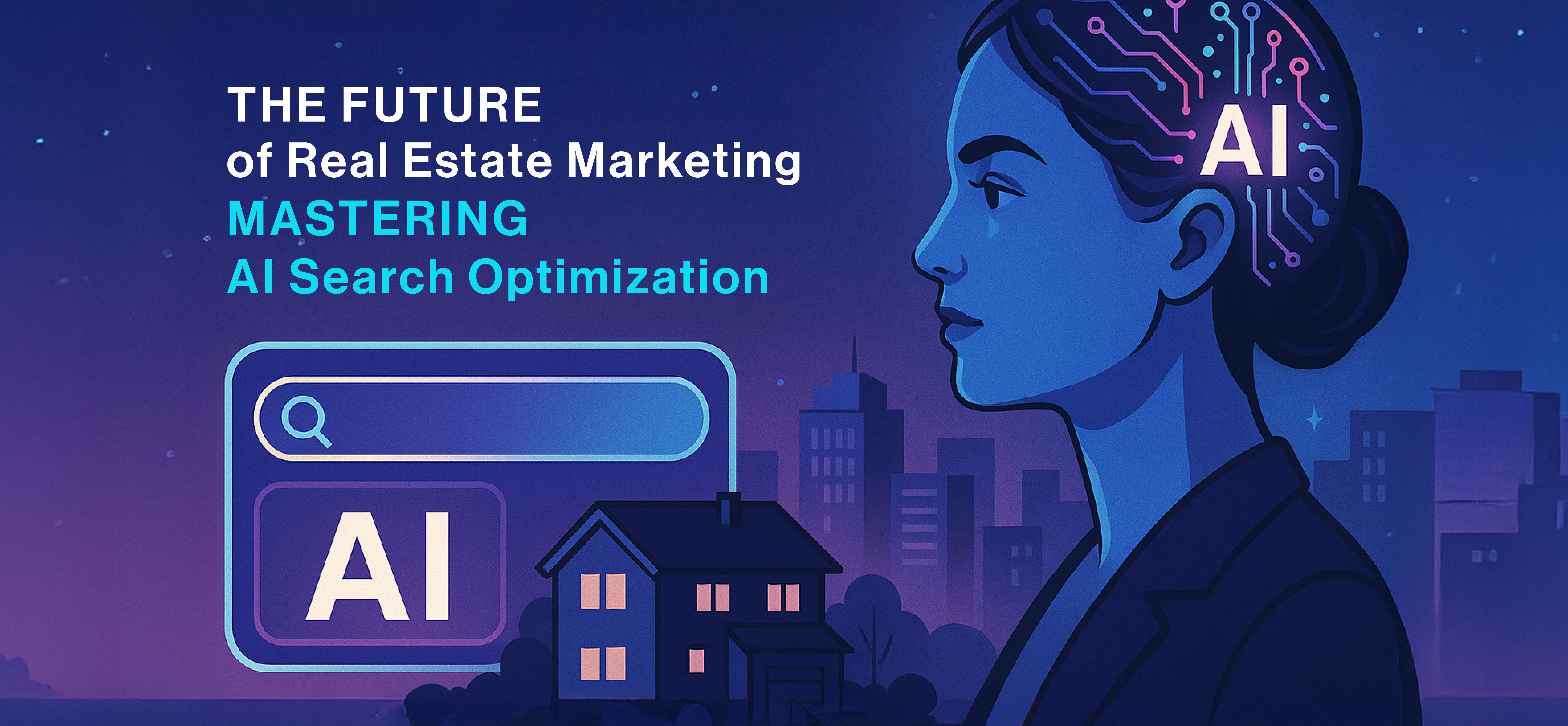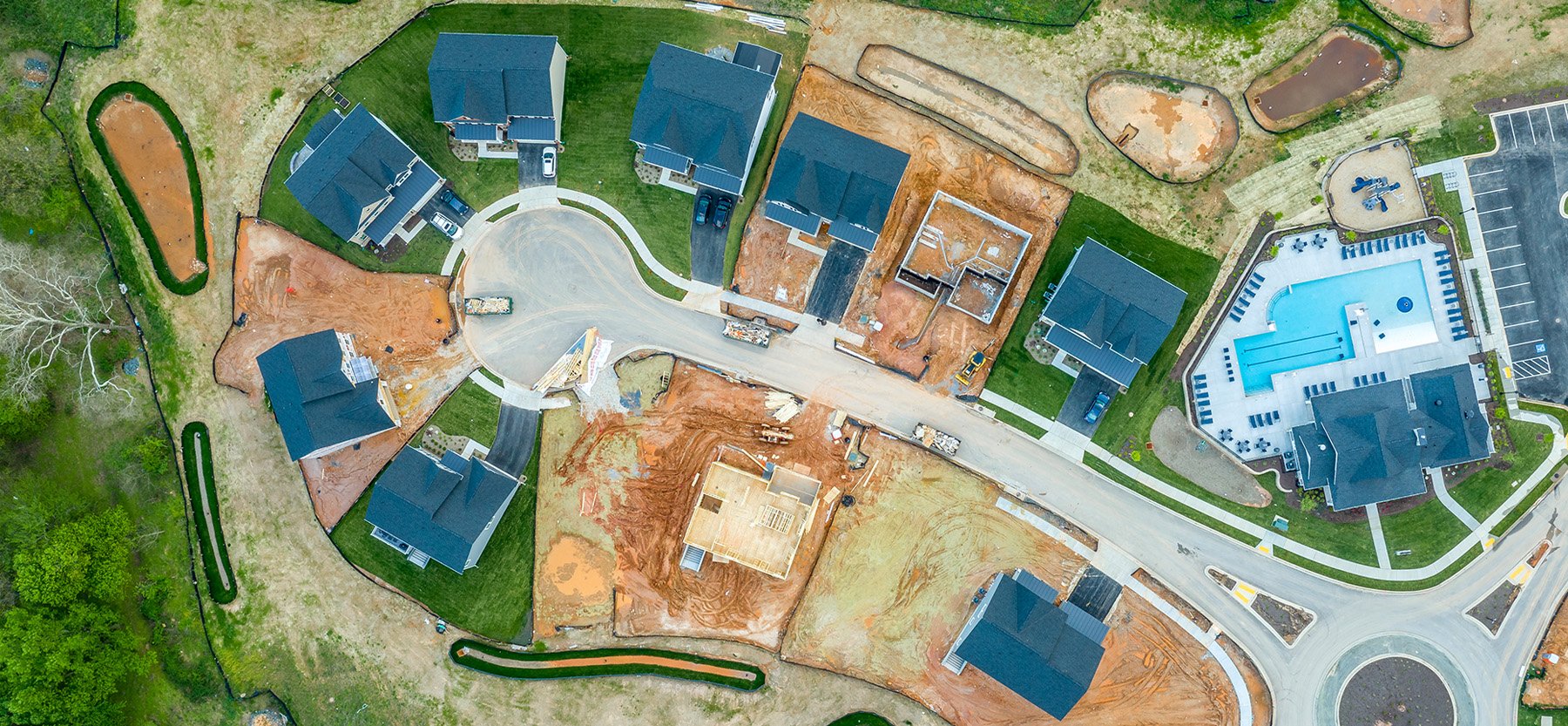August 20, 2025
The Future of Real Estate Marketing: Mastering AI Search Optimization
The digital landscape that home builders and master-planned community marketers have relied on for marketing is experiencing a seismic shift. Traditional search engine optimization is giving way to AI-powered search experiences that fundamentally change how potential home buyers discover and evaluate home builders and communities. With AI overviews now appearing in more than half of all Google searches (and in more than 62% of real estate-related searches) and dramatically reducing click-through rates to traditional websites by up to 37%, home builders can no longer rely solely on conventional SEO strategies.
This comprehensive article explores how AI search technologies, including AI overviews (AIO) and Generative Engine Optimization (GEO), are transforming home buyer behavior, the measurable impact on organic traffic and actionable strategies for optimizing your marketing content to thrive in this new landscape.
The AI Search Revolution: Understand the New Landscape
What is AI Search?
AI search represents a fundamental evolution in how search engines process and deliver information. Unlike traditional keyword-based search that simply matches terms to indexed pages, AI search uses natural language processing and machine learning to understand user intent, context and conversation patterns.
When a prospective home buyer searches for “energy efficient new homes under $500k near Denver,” AI search engines don’t just find pages containing those keywords. They interpret the search as a complex request involving price range, location preferences, sustainability features and lifestyle considerations, then synthesize information from multiple sources to provide comprehensive, conversational answers.
Key AI Search Technologies Impacting Home Builders and Real Estate Developers
AI Overviews (AIO): Google’s AI-generated summaries that appear at the top of search results, providing direct answers before traditional organic listings.
Answer Engine Optimization (AEO): While traditional SEO focuses on ranking websites, AEO targets platforms like ChatGPT, Gemini and Perplexity that are handling an increasing share of search queries.
Generative Engine Optimization (GEO): Strategies designed to optimize content specifically for AI systems that generate responses rather than simply ranking existing pages.
The Data: How AI is Disrupting Traditional Search
Massive Impact on Organic Click-Through Rates
The statistics paint a clear picture of AI’s disruptive impact on traditional organic search traffic.
Research by Ahrefs found that AI overviews lead to a 34.5% drop in click-through rates for position 1 listings. Their researchers analyzed how AIO’s impact user behavior in Google search, and their findings prove that these AI-generated summaries are not increasing clicks to websites but decreasing them, highlighting how search behavior is changing.
Even more concerning for home builders and real estate developers: studies show that Google’s AI Overviews are significantly decreasing clicks to traditional organic listings, especially for non-branded, informational queries, which saw a nearly 20% decline – exactly the type of content home builders and master-planned community developers typically use to attract new prospects.
AI Overview Prevalence is Growing Rapidly
Research from SEO Clarity shows that across nearly all industries that in March 2025, AIOs exploded, with most sectors more than doubling their AIO-triggering keywords compared to February. This rapid expansion means more home buyer searches will encounter AI-generated summaries first in search results, instead of traditional organic results.
The Crawl-to-Referral Problem
AI crawlers are extracting enormous amounts of content from home builder and community websites while providing virtually nothing in return. A recent Cloudflare article reveals that OpenAI’s crawlers had a crawl-to-referral ratio of 1,700-to-1, while Anthropic’s reached an astounding 73,000-to-1. Compare this to traditional Google search’s ratio of 14-to-1, and the unbalanced nature of AI systems becomes clear.
How Home Buyers Are Using AI in Their Search Process
The Rise of AI-Powered Home Search
Home buyer behavior has shifted dramatically toward AI-assisted research. A recent survey by Veterans United Home Loans revealed that more than one-third (39%) of prospective buyers are now leveraging AI tools for tasks like property discovery, neighborhood research and virtual tours, up 5% from the previous quarter. This represents a fundamental change in the home buyer journey, with AI serving as a primary discovery and filtering mechanism.
The Question-Based Search Pattern
Modern home buyers aren’t just searching for “3 bedroom homes Orlando.” They’re asking full questions like “What should I look for in a master-planned community with good schools and walkability?” or “How do I evaluate energy efficiency in new construction homes?”
This conversational search pattern requires a completely different content approach than traditional keyword optimization. Builders must anticipate and answer these specific questions directly and comprehensively.
Early-Stage Authority Building
When your content appears in AI-generated responses, you establish authority before potential home buyers even visit your website. This positions your brand as a trusted expert early in their decision-making process, potentially influencing their entire evaluation framework.
The Strategic Impact on Home Builder and Real Estate Marketing
Why Traditional SEO Strategies Are Insufficient
The data reveals a stark reality: visibility in organic search is shrinking, especially for non-branded and lower-ranking keywords. Home builders and master-planned community developers who rely primarily on traditional SEO for lead generation face significant challenges as AI systems capture and synthesize their content without driving traffic back to their websites.
Non-branded keywords suffer most: These informational searches that home builders use to attract new prospects are increasingly answered directly by AI, reducing the need for users to click through to home builder websites.
Lower-ranking pages see dramatic declines: If your content isn’t in the top three organic positions, AI Overviews make visibility even more challenging.
The Opportunity Within the Challenge
Despite these challenges, AI Overviews (and Featured Snippets, to an extent) provide an opportunity for those who know how to navigate them. Builders who optimize for AI inclusion can capture significant share by appearing in these prominent answer positions.
AI Search Optimization Strategies for Real Estate
1. Shift Content from Keywords to Questions
Traditional Approach: “Custom homes Houston,” “luxury home builder near me” or “energy efficient new homes”
AI-Optimized Approach:
- “What makes a new home energy efficient?”
- “How long does custom home construction take in Texas?”
- “What should I budget for a down payment?”
Structure your content around the actual questions home buyers ask, using natural language that mirrors their search patterns.
2. Master the Art of Direct Answers
AI systems prioritize content that provides immediate, clear answers. Structure your content with:
- Summary-first approach: Lead with the key takeaway in the opening paragraph.
- Question-style headers: Use H2 tags that match real home buyers’ questions.
- Concise explanations: Follow the answer with supporting detail and context.
- Logical flow: Organize information in digestible, scannable sections.
3. Optimize Content Structure for AI Recognition
Use Structured Formatting
- Numbered lists for processes and timelines
- Bullet points for key features and benefits
- Bold text for key concepts
- Short paragraphs (2-3 sentences maximum)
Implement schema markup: Help AI systems understand your content’s context with proper structured data labeling your business information, services, reviews and location details.
Create FAQ sections: Directly address common home buyer questions with dedicated Q&A content that AI systems can easily extract and reference.
4. Focus on Authoritative, Comprehensive Content
AI systems also favor content that demonstrates expertise and provides complete answers. Instead of thin, keyword-focused pages, create comprehensive resources that thoroughly address home buyer concerns.
Example:
- Before: “We build energy-efficient homes with ENERGY STAR certification.”
- After: “What makes a home truly energy efficient? Our homes achieve 30% greater efficiency than standard construction through advanced insulation systems, high-performance windows and smart HVAC controls. Here’s how each component contributes to lower utility bills and improved comfort…”
5. Local Context and Conversational Language
AI search rewards content that sounds natural and provides relevant local context. Instead of robotic, keyword-stuffed content, write as if you’re having a conversation with a knowledgeable prospect.
- Include local landmarks and neighborhood references.
- Use conversational transitions and natural phrasing.
- Address specific regional considerations such as climate, local regulations, etc.
Measuring AI Search Impact
Setting Up AI Traffic Monitoring
To understand how AI search affects your website traffic, establish tracking systems that can identify visits from AI platforms. Google Analytics 4 allows for:
- Creating custom segments for AI referral traffic.
- Tracking key metrics for those segments.
- Comparing AI-referred traffic engagement vs. traditional organic traffic.
Key metrics to monitor include:
- Percentage of total traffic from AI platforms.
- Conversion rates of AI-referred visitors.
- Time on site and page depth for AI traffic.
- Brand mention frequency in AI responses.
Advanced Optimization Techniques
1. Content Layering Strategy
Structure content with multiple information depths:
- Surface level: Quick answers for AI extraction.
- Mid-level: Supporting details and context.
- Deep level: Comprehensive guides and resources.
This approach satisfies both AI systems looking for quick answers and users who click through for detailed information.
2. Cross-Platform Optimization
Different AI platforms have varying content preferences:
- ChatGPT: Favors comprehensive, educational content.
- Google AI Overviews: Prefer concise, structured answers.
- Voice Assistants: Optimized for conversational, spoken responses.
3. Semantic Content Clustering
Group related content around core themes rather than individual keywords. Create content clusters that comprehensively address broader home buyer concerns like “financing options,” “construction process” or “neighborhood selection.”
The Future of AI Search and Real Estate Marketing
Emerging Trends to Watch
Voice search integration: As AI assistants become more sophisticated, optimize for voice-based queries.
Visual AI search: Prepare for AI systems that can interpret and search floor plans, photos and virtual tours.
Hyper-personalization: AI will increasingly customize search results based on individual home buyer preferences and behavior patterns.
Building Long-Term Resilience
Diversify traffic sources: Reduce reliance on organic search alone.
Strengthen brand recognition: Branded searches remain more resilient to AI disruption.
Invest in direct relationships: Email lists, social media followings and referral networks become increasingly valuable.
Embracing the AI Search Future
The transformation of search behavior represents both a significant challenge and an unprecedented opportunity for home builders and real estate developers. Those who adapt their content strategies to work with AI systems rather than against them will establish competitive advantages that compound over time.
AI search isn’t replacing traditional SEO entirely – it’s evolving it. The fundamental principles of providing valuable, user-focused content remain constant. However, the methods for structuring, formatting and delivering that content must evolve to meet the expectations of both AI systems and the home buyers who rely on them.
The home builders and real estate developers who thrive in this new landscape will be those who embrace AI search as a powerful tool for establishing expertise, building trust and connecting with potential home buyers at the moment they’re seeking guidance and solutions.
Ready to optimize your real estate or home builder marketing for the AI search era? At Milesbrand, we specialize in helping new home builders and master-plan community developers navigate the evolving digital landscape. Contact us today to learn more about how we can help your brand remain visible as search behavior continues to transform.




.jpg)







